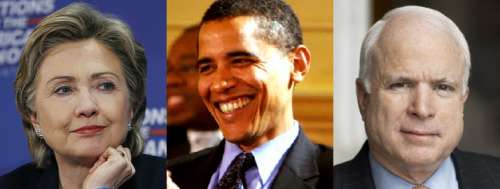
Scientists in the US have sent out a fresh call for the three main US presidential candidates to take part in a public debate on science.
Organizers of ScienceDebate 2008, a petition for a science debate that has so far been signed by some 37,000 people, had invited the candidates to a debate on Friday 18 April in Philadelphia, but were forced to cancel last week because of a poor response. Barack Obama, one of the two Democratic candidates, declined to attend, while both Hillary Clinton, the other Democratic candidate, and John McCain, the stronger Republican candidate, gave no reply.
The candidates have now been sent new invitations for a debate in Oregon for three possible dates in early May.
One of the organizers, Lawrence Krauss, a physicist from Case Western Reserve University in Cleveland, Ohio, told physicsworld.com he is disappointed that the candidates did not react, although he is not particularly surprised. “When I first publicly called for a debate I never imagined it would be a realistic possibility, and the avalanche of support from all sectors of the country has amazed me,” he says. “Of course, the candidates have to be convinced it is in their best interest, and also that they will not come off as looking ignorant. It is an uphill battle, but a battle that I think is worth continuing to fight.”
Gathering momentum
The idea of ScienceDebate 2008 was formed towards the end of last year by a small group of six people including Krauss and screenwriter Matthew Chapman. Although initially there was little attention from the media, awareness grew quickly via internet blogs, forums and a page on the social networking site Facebook.
Among those to have signed the petition are 80 university presidents, more than 100 representatives from institutions such as the American Institute of Physics, and over 20 Nobel laureates, including the likes of David Gross, Steve Chu and John Mather.
Backers of the debate proposal want the presidential candidates to discuss a number of key issues, including:
- Innaccurate media coverage of science
- Poor science eductation
- Public illiteracy
- Either flat funding or funding cutbacks for research
- Insufficient public policy response to climate change and other environmental issues
- Government suppression of science information
“Such a debate will do a tremendous amount to raise public awareness of the vital connection between science, technology and public policy,” says Krauss. “As I have often stated, science and technology form a fundamental component of almost every major issue the next president will have to deal with, from the environment, to national defence, from energy to economic competitiveness.
“Many people in the public simply do not realize this deep connection, nor do they have regular access to important information that can help them make sensible decisions in the voting booth. As far as the candidates are concerned, I would like to see them forced to focus, even for a day or two, on precisely what the key issues are, and what their positions should be on them, in advance of being thrust into the Oval office and playing catch-up.”
Hidden policies
So far the candidates have only mentioned science in passing. Clinton has an “innovation agenda”, which includes promises to increase basic research funding by 50%, triple the number of National Science Foundation fellowships, encourage more women into science and “restore integrity to science policy”. Obama plans to double basic research funding, increase the number of scientists from ethnic minorities in science and listen more carefully to the opinions of scientists when tackling political science issues such as climate change. McCain has devoted less time to science issues, though he has also vowed to tackle climate change.
“I watched most of the debates and I was surprised to see how little science and technology were being mentioned,” says Chapman. “It seemed to me that although polls suggest the American public is not interested in science, that is probably only because it does not make the connection between the benefits it has received from science, and the solutions science could provide in the future, and science itself. People are concerned about the environment, for example, but don’t seem to understand that science is what brings us the information that we either use or abuse.”
Chapman refuses to consider that the candidates might not respond to the new invites, which are for May 2, May 9 or May 16. “It has been suggested that the candidates may be worried that they will not be scientifically equipped to discuss these issues. They should not have this concern — this is not a pop quiz. What we are looking for is a debate in which they explain some of their proposed approaches to these important issues. Most importantly, we want them to demonstrate, by attending our debate, that they are aware of the incredible importance of science and technology in modern life.”



